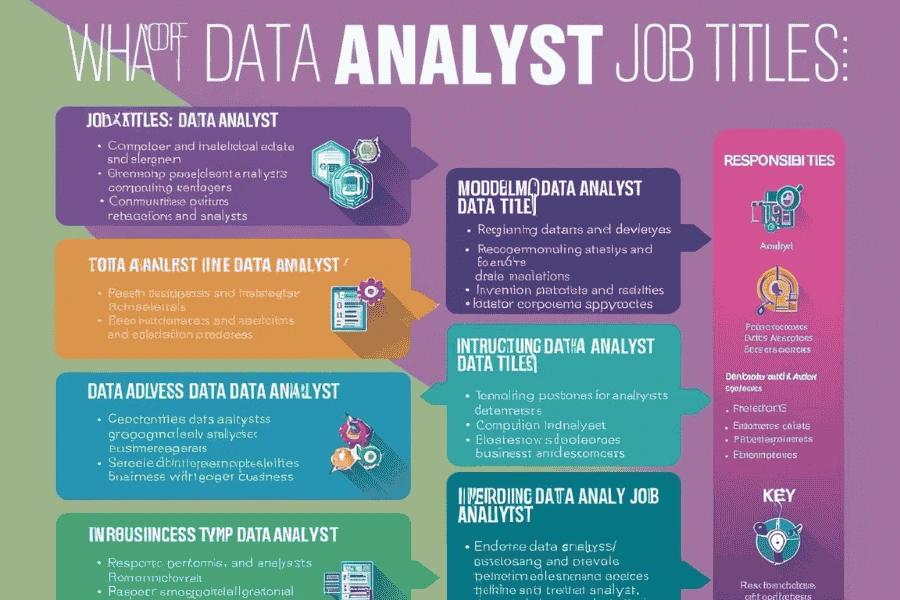Data Analyst Job Titles Explained: What Interviewers Are Really Hiring Fo
Introduction
In today’s fast-growing data industry, job titles like Data Analyst, Business Analyst, Data Scientist, and Data Engineer can be quite confusing. Different companies might use the same title to mean different things, or assign various titles based on their unique team structure. Instead of focusing solely on the job title, it’s more effective to study the job description and the skills needed. This article will break down common data-related job titles, clarify their main responsibilities, and guide you on how to prepare for interviews by understanding what employers really want.

Why Do Data Job Titles Vary So Much?
The diversity in data job titles is mainly because the field is rapidly changing and organizations have different ways of naming roles. Some companies prefer trendy titles to attract candidates, while others assign titles based on hierarchy or the team’s function. Therefore, two roles with the same name might have very different duties. To avoid confusion, it’s best to look at the specific job responsibilities and required skills rather than just the title. Knowing the differences between roles like Data Analyst vs. Data Scientist or Data Analyst vs. Business Analyst can help you focus your job search and career development.
What Does a Data Analyst Do?
A Data Analyst is responsible for gathering, cleaning, and interpreting data to help teams make informed business decisions. They often use tools such as Excel, SQL, Tableau, or Power BI to analyze trends and create reports and dashboards. The focus is mainly on descriptive and diagnostic analytics, answering questions like “What happened?” and “Why did it happen?” Enhancing your data analyst skills, including proficiency with common data analyst tools and gaining some advanced data analyst skills, can boost your ability to provide valuable insights.
The Role of a Business Analyst
Business Analysts work as intermediaries between business units and technical teams. While they need some data knowledge such as basic SQL or Excel their primary job is to gather business requirements and improve processes. Strong communication and understanding of business operations are essential, as they translate data findings into strategies that the business can act on. If you’re curious about the business analyst vs. data analyst debate, or wondering how to become a business analyst, focusing on key business analyst skills is a good starting point.
What Is a Data Scientist?
Data Scientists use more complex statistical methods, machine learning, and predictive modeling to analyze large datasets. They typically code in Python or R and develop algorithms that can predict future trends or automate decisions. Unlike data analysts, their work is more technical and model-driven rather than simply reporting past data. Understanding the difference between data science vs. data analytics will help clarify this role’s deeper technical focus.
Data Engineer: Building the Data Infrastructure
Data Engineers create and maintain the systems that allow data to move smoothly within an organization. They develop ETL (Extract, Transform, Load) processes, manage databases, and ensure data accessibility and quality. This job requires strong software engineering skills and experience with cloud services and big data tools. If you want to understand what a data engineer does or the difference between data engineer and data scientist, this knowledge can help you decide if this behind-the-scenes role suits you.
Leadership Roles: Analytics Manager and Team Lead
Artificial Intelligence and Machine Learning Integration
Analytics Managers or Leads supervise teams and manage analytics projects. Beyond technical knowledge, these roles require project management, strategic planning, and clear communication with executives. They prioritize analytics initiatives, allocate resources, and mentor team members to maximize the value derived from data. To explore this path, look into analytics manager job descriptions and consider how career progression for data analysts can lead to management.
Other Data-Related Positions to Know
Besides these main roles, you might also encounter Data Visualization Specialists who focus on storytelling through data graphics, Quantitative Analysts who apply mathematical models (often in finance), and Machine Learning Engineers who take data science models and deploy them into production. It’s also helpful to compare data analyst vs. statistician or data analyst vs. business intelligence analyst to understand specialized niches.
Conclusion
Understanding the variety of data analyst job titles and what each role truly involves is essential for anyone pursuing a career in data. Instead of focusing solely on job titles, pay close attention to the specific responsibilities, skills, and tools required. Whether you aim to become a Data Analyst, Business Analyst, Data Scientist, or Data Engineer, knowing these distinctions will help you tailor your resume, prepare effectively for interviews, and choose the right career path. Continuously developing your skills and staying updated on industry trends will ensure you remain competitive in the ever-evolving data field.
Active Events
3 Must Have Projects On your CV to Get into Data Analysis
Date: Aug 05, 2025 | 7:00 PM(IST)
7:00 PM(IST) - 8:10 PM(IST)
2753 people have registered
Transition from Non-Data Science to Data Science Roles
Date: Aug 07, 2025 | 7:00 PM (IST)
7:00 PM (IST) - 8:10 PM (IST)
2753 people have registered
Bootcamps
Data Analyst Bootcamp
- Duration:8 weeks
- Start Date:October 5, 2024
Data Science Bootcamp
- Duration:8 weeks
- Start Date:October 5, 2024
